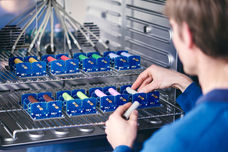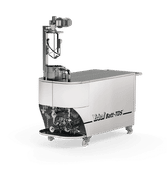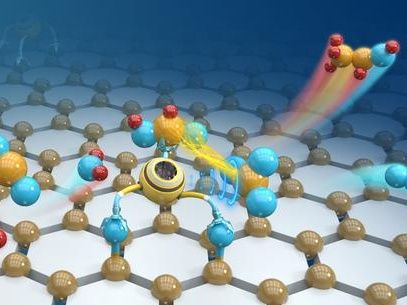Researchers create technology to produce lighter, long-lasting batteries from silicon
Substantially smaller and longer-lasting batteries for everything from portable electronic devices to electric cars could be come a reality thanks to an innovative technology developed by University of Waterloo researchers.
Zhongwei Chen, a chemical engineering professor at Waterloo, and a team of graduate students have created a low-cost battery using silicon that boosts the performance and life of lithium-ion batteries.
Waterloo's silicon battery technology promises a 40 to 60 per cent increase in energy density, which is important for consumers with smartphones, smart homes and smart wearables.
The environmentally safe technology could also make dramatic improvements for hybrid and electric vehicles. The findings could mean an electric car may be driven up to 500 kilometres between charges and the smaller, lighter batteries may significantly reduce the overall weight of vehicles.
Current lithium-ion batteries normally use graphite anodes. The Waterloo engineers found that silicon anode materials have a much higher capacity for lithium and are capable of producing batteries with almost 10 times more energy.
"Graphite has long been used to build the negative electrodes in lithium-ion batteries," said Professor Chen, the Canada Research Chair in Advanced Materials for Clean Energy and a member of the Waterloo Institute for Nanotechnology and the Waterloo Institute for Sustainable Energy. "But as batteries improve, graphite is slowly becoming a performance bottleneck because of the limited amount of energy that it can store."
The most critical challenge the Waterloo researchers faced when they began producing batteries using silicon was the loss of energy that occurs when silicon contracts and then expands by as much as 300 per cent with each charge cycle. The resulting increase and decrease in silicon volume forms cracks that reduce battery performance, create short circuits, and eventually cause the battery to stop operating.
To overcome this problem, Professor Chen's team along with the General Motors Global Research and Development Centre developed a flash heat treatment for fabricated silicon-based lithium-ion electrodes that minimizes volume expansion while boosting the performance and cycle capability of lithium-ion batteries.
"The economical flash heat treatment creates uniquely structured silicon anode materials that deliver extended cycle life to more than 2000 cycles with increased energy capacity of the battery," said Professor Chen.
Original publication
Other news from the department science
These products might interest you
Most read news
More news from our other portals
See the theme worlds for related content
Topic World Battery Technology
The topic world Battery Technology combines relevant knowledge in a unique way. Here you will find everything about suppliers and their products, webinars, white papers, catalogs and brochures.

Topic World Battery Technology
The topic world Battery Technology combines relevant knowledge in a unique way. Here you will find everything about suppliers and their products, webinars, white papers, catalogs and brochures.
































































